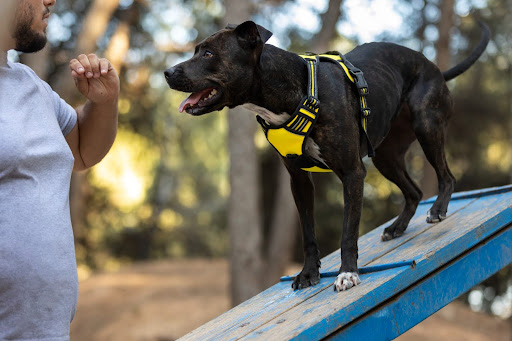Aggression in Dogs: How Dog Behaviour Trainers Can Help

Hey there, fellow dog lovers!
Have you ever found yourself in a situation where your furry best friend suddenly shows signs of aggression, leaving you scratching your head in confusion and concern?
Don’t worry; you’re not alone. Many dog owners face similar challenges when dealing with aggression in their beloved pets.
So, today, we’re going to explore how dog behaviour training can be your saving grace when it comes to tackling aggression in dogs.
Understanding Dog Aggression:
Aggression in dogs can manifest in various forms, from growling and barking to biting and lunging. It’s essential to recognize these behaviours and understand their underlying causes to address them effectively.
Types of Aggression:
Dogs can exhibit aggression due to various factors, some of which include:
- Fear
- Territoriality
- Possessiveness
- Frustration
Identifying the type of aggression your dog displays is crucial in developing a targeted behaviour modification plan.
The Role of Environment and Genetics:
It’s also essential to understand that aggression in dogs isn’t solely about their personality. Factors like genetics and environment play significant roles, too. A dog’s upbringing, socialization, and even their breed can influence their behaviour. But here’s the good news – regardless of these factors, behaviour can often be modified with the right approach.
Why DIY Solutions Might Not Work
Attempting to conduct aggressive dog training without professional guidance can be risky. DIY solutions often overlook underlying issues and may inadvertently reinforce negative behaviours. Here are three more reasons why going the DIY route might not yield the desired results:
- Lack of Expertise:
Dog aggression is a complex issue that requires a deep understanding of canine behaviour and psychology. Without proper expertise, it’s easy to misinterpret your dog’s actions or apply ineffective training techniques.
- Safety Concerns:
Aggressive behaviour in dogs can escalate quickly and pose a safety risk to both the dog owner and others around them. Without professional guidance, attempting to manage or modify aggressive behaviour can put you in potentially dangerous situations.
- Delayed Progress:
DIY solutions often lack structure and consistency, leading to slow or minimal progress in addressing aggression issues. Behaviour modification requires a systematic approach with clear goals and milestones.
How Dog Behaviour Trainers Can Help
- Thorough Assessment:
Dog behaviour trainers conduct a comprehensive assessment of your dog’s behaviour, including their history, triggers, and environmental factors. This in-depth understanding allows them to identify the root causes of aggression and develop a targeted intervention plan tailored to your dog’s specific needs.
- Customized Behavior Modification Plans:
Armed with insights from the assessment, behaviour trainers create customized behaviour modification plans designed to address your dog’s aggression effectively. These plans outline step-by-step strategies and techniques to encourage positive behaviours while gradually reducing aggressive responses.
- Positive Reinforcement Techniques:
Instead of resorting to punishment or aversive methods, behaviour trainers employ positive reinforcement techniques to encourage desirable behaviours in your dog. By rewarding good behaviour with treats, praise, or play, they create a positive association and motivate your dog to repeat those behaviours.
- Effective Communication:
Behaviour trainers not only work with your dog but also coach you on effective communication techniques. They teach you how to interpret your dog’s body language, communicate clear expectations, and reinforce desired behaviours consistently. This strengthens the bond between you and your dog and enhances your ability to manage challenging situations.
Conclusion
If your dog is struggling with aggression issues, know that you’re not alone. By enlisting the help of a qualified dog behavior trainer, you can embark on a journey to address these challenges effectively.
With patience, consistency, and the right approach, you can help your furry friend become a happier and well-adjusted member of your family.

